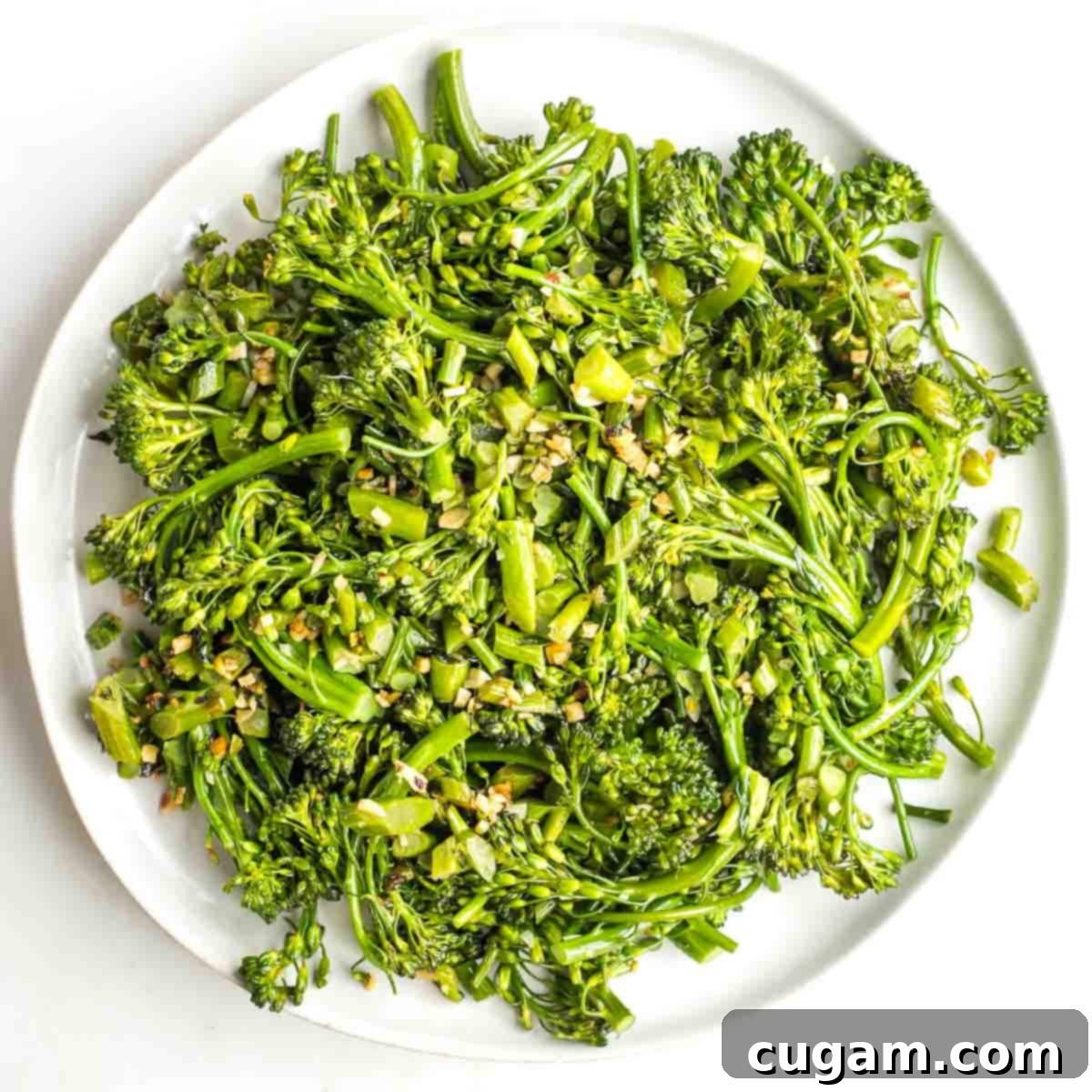Quick & Easy Sautéed Broccolini with Garlic: Your Ultimate 10-Minute Side Dish
Discover the secret to a truly vibrant and utterly delicious vegetable side dish that comes together in under 10 minutes! This sautéed broccolini with garlic and a hint of red pepper is bursting with flavor, incredibly easy to make, and downright craveable. Imagine a nutritious green vegetable that’s both simple to prepare and tastes absolutely amazing – you’ve found it right here. Forget bland greens; this recipe will transform your weeknight dinners and impress your guests, all while being a fantastic healthy addition to any meal.
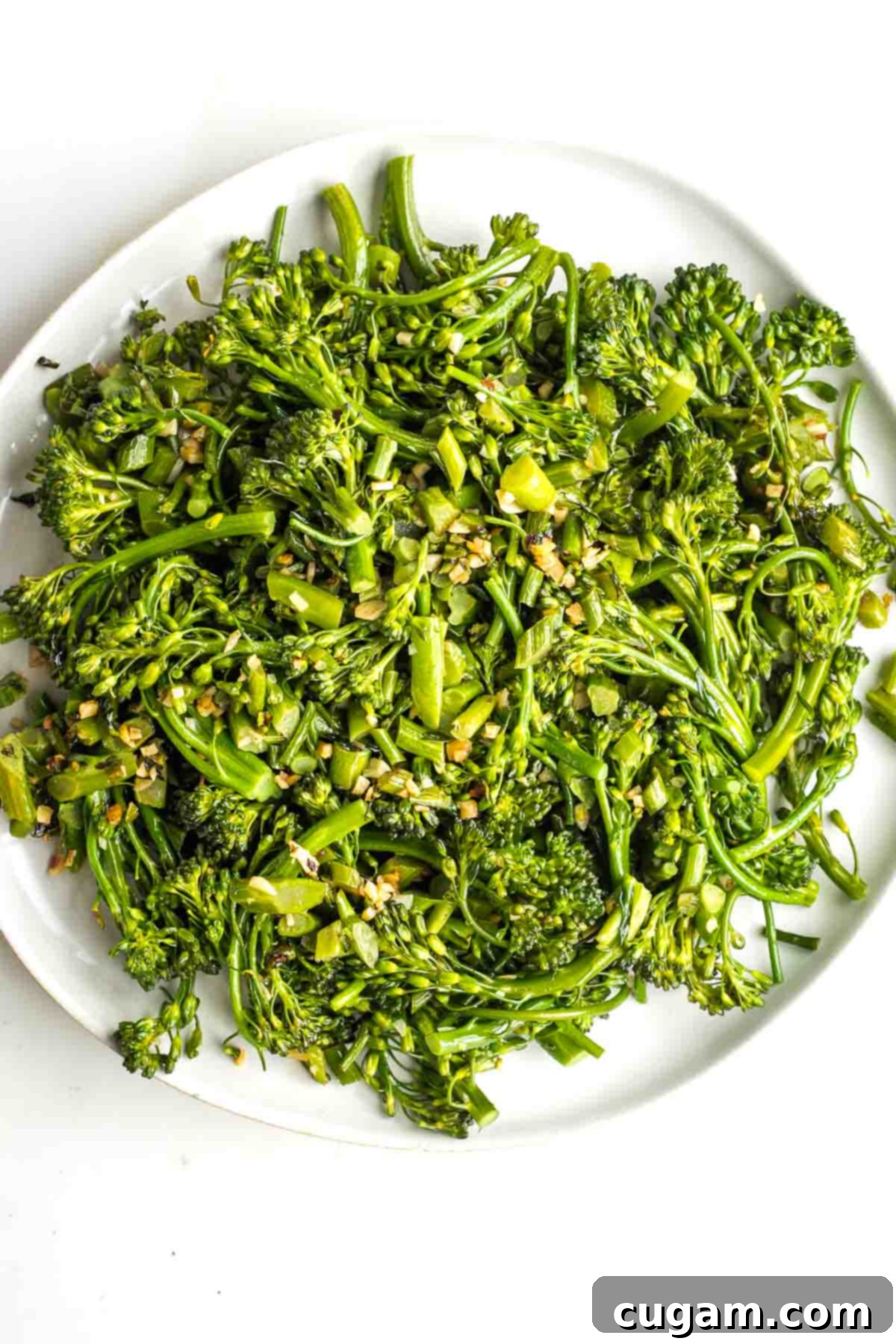
[feast_advanced_jump_to]
This easy sautéed broccolini recipe is the flavorful and healthy side dish everyone needs in their life. It’s truly my absolute favorite way to prepare fresh broccolini. Using just a few simple ingredients like aromatic fresh garlic and a pinch of red chili flakes elevates this humble green vegetable into something extraordinary, making it taste truly incredible. It’s perfect for busy weeknights, special occasions, or simply whenever you crave a fast, delicious, and nutritious vegetable.
Why You’ll Adore This Sautéed Broccolini Recipe
There are countless reasons why this garlic broccolini recipe will become a staple in your kitchen. Beyond its fantastic taste, it offers unparalleled convenience and versatility:
- Effortlessly Quick and Easy: From the moment you pull your broccolini from the fridge to serving it on the table, this dish takes less than 10 minutes. It’s perfect for those busy evenings when you want a homemade, healthy meal without the fuss.
- Convenient Stovetop Method: No need to preheat a large oven or wait for long baking times. Everything cooks perfectly in a single skillet on your stovetop, saving you time and energy.
- Surprisingly Tasty: Prepare to be amazed! This recipe proves that healthy vegetables can be incredibly flavorful and fun to eat. The combination of tender-crisp broccolini, aromatic garlic, and a touch of heat creates a truly delightful experience.
- Highlights Natural Flavors with Simple Ingredients: By using just a few high-quality ingredients, this recipe allows the delicate, sweet flavor of the baby broccoli to truly shine, complemented by classic seasonings.
- Universally Appealing Veggie Side Dish: This recipe is naturally vegan and gluten-free, making it a wonderful and inclusive option for everyone at your table, catering to various dietary preferences without compromising on taste.
- Boosts Your Health: Broccolini is packed with vitamins and antioxidants, making this not just a delicious choice, but a genuinely nutritious one too.
Essential Ingredients and Clever Substitutions
You’ll love how minimal and straightforward the ingredient list is for this sautéed broccolini recipe. Each component plays a vital role in creating its irresistible flavor:
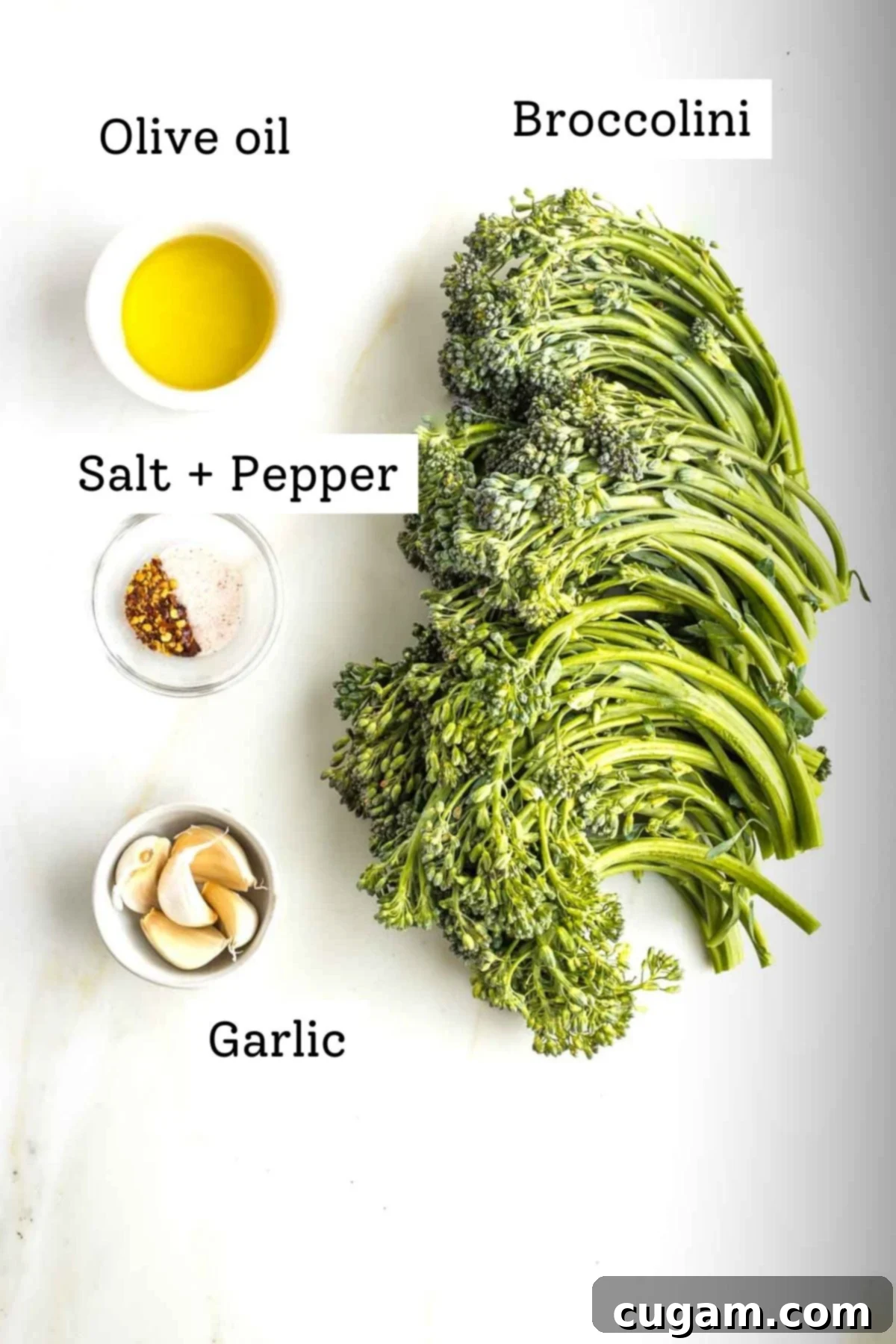
- Broccolini: Also known as baby broccoli, you’ll typically need a couple of bunches to make up a pound. Broccolini is a hybrid of regular broccoli and Chinese broccoli, prized for its longer, thinner stalks and milder, sweeter flavor. If broccolini isn’t available, you can easily substitute it with regular broccoli florets or even use broccoli rabe (rapini). However, keep in mind that broccoli rabe has a distinctly more bitter flavor compared to the sweeter notes of broccolini, so adjust your expectations accordingly.
- Olive oil: High-quality extra virgin olive oil not only adds a rich, fruity flavor but also aids in the absorption of the fat-soluble vitamins present in the broccolini, maximizing its nutritional benefits. If you prefer to cook without oil, you can sauté the broccolini in a splash of water or vegetable broth. Just remember to include some healthy fats from nuts, seeds, or a drizzle of tahini in your meal to help your body absorb those essential nutrients.
- Garlic: For the most authentic and robust flavor, fresh garlic cloves are highly recommended. Mince the garlic cloves finely or use a microplane grater to achieve a paste-like consistency. It’s a good practice to mince the garlic and let it sit for a few minutes before cooking; this allows the beneficial antimicrobial compounds to develop. If fresh garlic isn’t an option, garlic powder can be used (about ¼ teaspoon per clove), but avoid garlic salt as it can make the dish overly salty.
- Salt and Pepper: I personally prefer coarse grain sea salt for its texture and depth of flavor. For a delightful kick, I add a healthy pinch of red pepper flakes. If you prefer a milder taste or have a low tolerance for heat, freshly ground black pepper is an excellent alternative that still provides a pleasant aromatic warmth.
How to Choose the Freshest Broccoli & Broccolini
No matter which type of broccoli you choose, remember that the entire vegetable is edible – from the tender florets to the fiber-rich stems and antioxidant-packed leaves. When selecting your greens, look for vibrant, deep green or even purplish florets. Avoid any with yellow flowers, as this indicates the plant was left in the field longer and may have a more bitter flavor. Freshness is key for the best taste and texture.
- Regular broccoli: Often referred to as Calabrese broccoli (named for the town Calabria in Italy), this is the most common variety found in grocery stores. It features thick, lighter green stalks topped with dark green, compact florets. It’s sturdy and versatile, perfect for roasting, steaming, or sautéing, though its thick stems require a bit more cooking time than broccolini.
- Chinese broccoli: Known as gai lan or Chinese kale, this variety is characterized by its long, thin stems and large, dark green, cabbage-like leaves. It’s celebrated for its slightly bitter yet sweet flavor and is a fantastic source of beta-carotene and Vitamin E, making it a highly nutritious choice in Asian cuisine.
- Baby broccoli (Broccolini): This delightful vegetable is a hybrid cross between regular broccoli and Chinese broccoli. It boasts longer, thinner stalks and smaller, more delicate florets compared to traditional broccoli. Broccolini is generally milder, sweeter, and softer, which also means it cooks much more quickly, making it ideal for quick sautéing like in this recipe.
- Broccoli Rabe: Also known as rapini, broccoli rabe is distinctive for its abundance of stems and leaves, with only small, bud-like florets. It’s renowned for its assertive, bitter taste, which pairs wonderfully with rich flavors like sausage or robust Italian dishes. While edible, it requires careful preparation to balance its bitterness.
- Romanesco broccoli: A truly striking vegetable, Romanesco broccoli (or Romanesco cauliflower) is an artful wonder with its fractal-like, spiraling light green florets. Its flavor is a fascinating blend of broccoli and cauliflower, with a firm, crunchy texture and a nutritional profile similar to broccoli.
Prepping Your Broccolini: The Key to Even Cooking
Properly trimming broccolini is essential for ensuring all parts cook evenly and achieve that perfect tender-crisp texture. Since the slender stems are heartier and take slightly longer to cook than the delicate florets, we’ll separate them for staggered cooking. Grab two separate bowls to keep the trimmed parts organized.
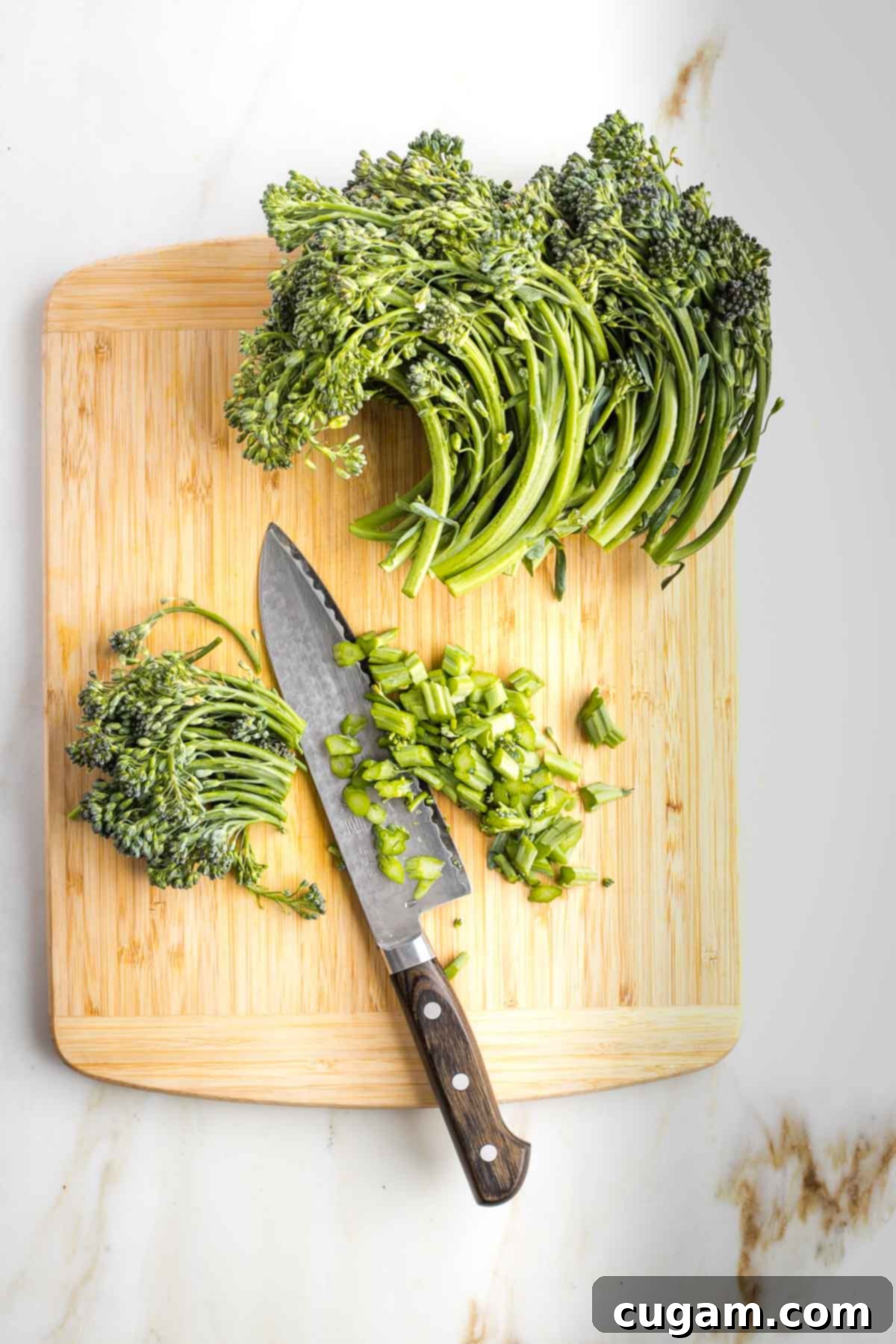
Begin by cutting off the very bottom, typically the bottom third, of the broccolini stems. Slice these thicker stem portions into uniform ½-inch pieces. Unlike regular broccoli, broccolini stems are generally quite thin and tender, but this initial cut helps ensure consistent cooking.
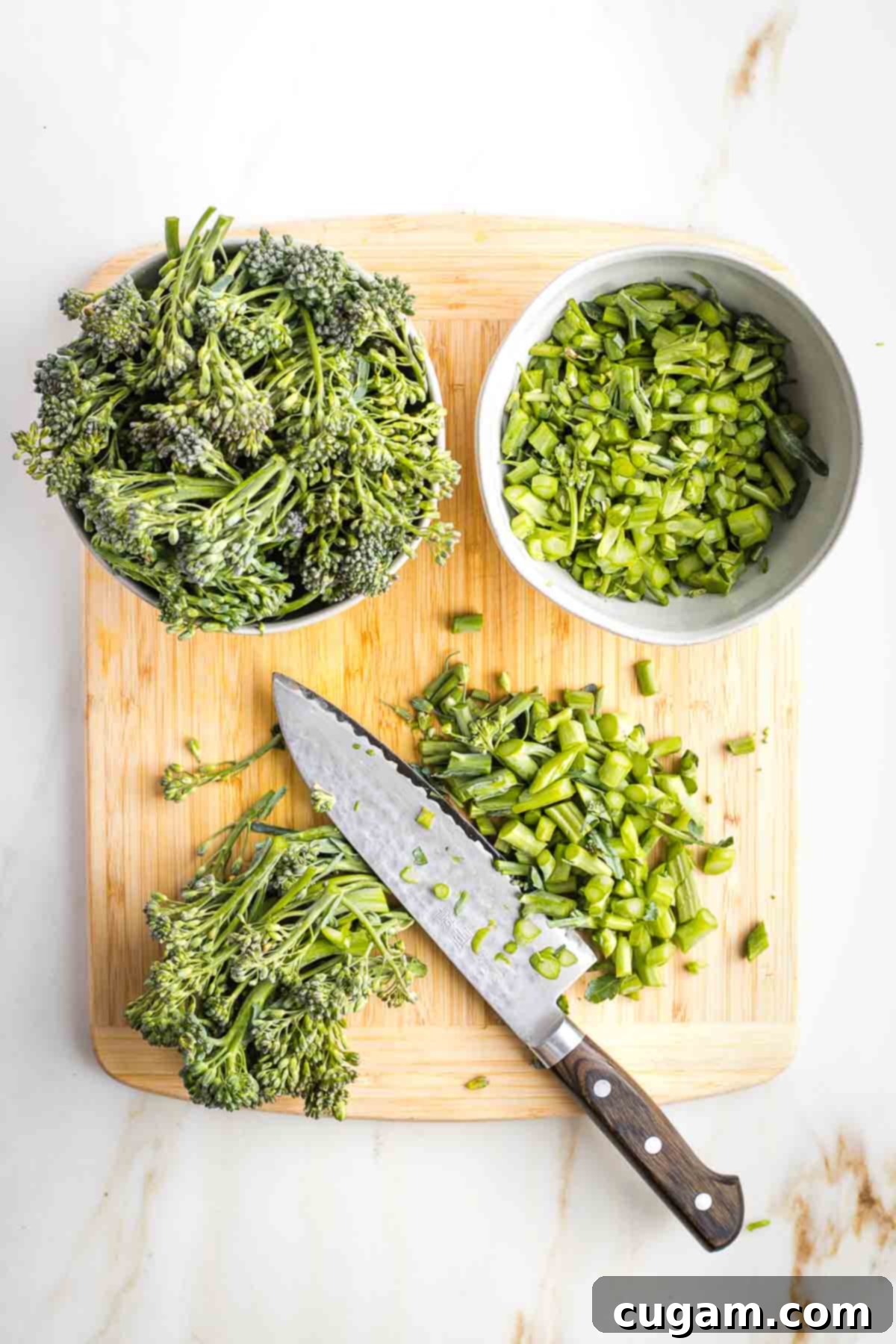
Place the thicker, sliced stem pieces into one small bowl. The remaining thinner stems and delicate florets (the top two-thirds of the broccolini) go into a second bowl. Don’t discard the broccolini leaves – they are edible and delicious! If you have any, add them to the bowl with the florets. This separation ensures that everything cooks to perfection without overcooking the more tender parts.
Continue to Prep Ingredients for a Seamless Cook
Once your broccolini is trimmed, it’s time to get the rest of your ingredients ready. This “mise en place” approach ensures a smooth and stress-free cooking experience, especially for a quick recipe like this one. Having everything prepped and measured before you start heating the pan is crucial for preventing anything from burning.
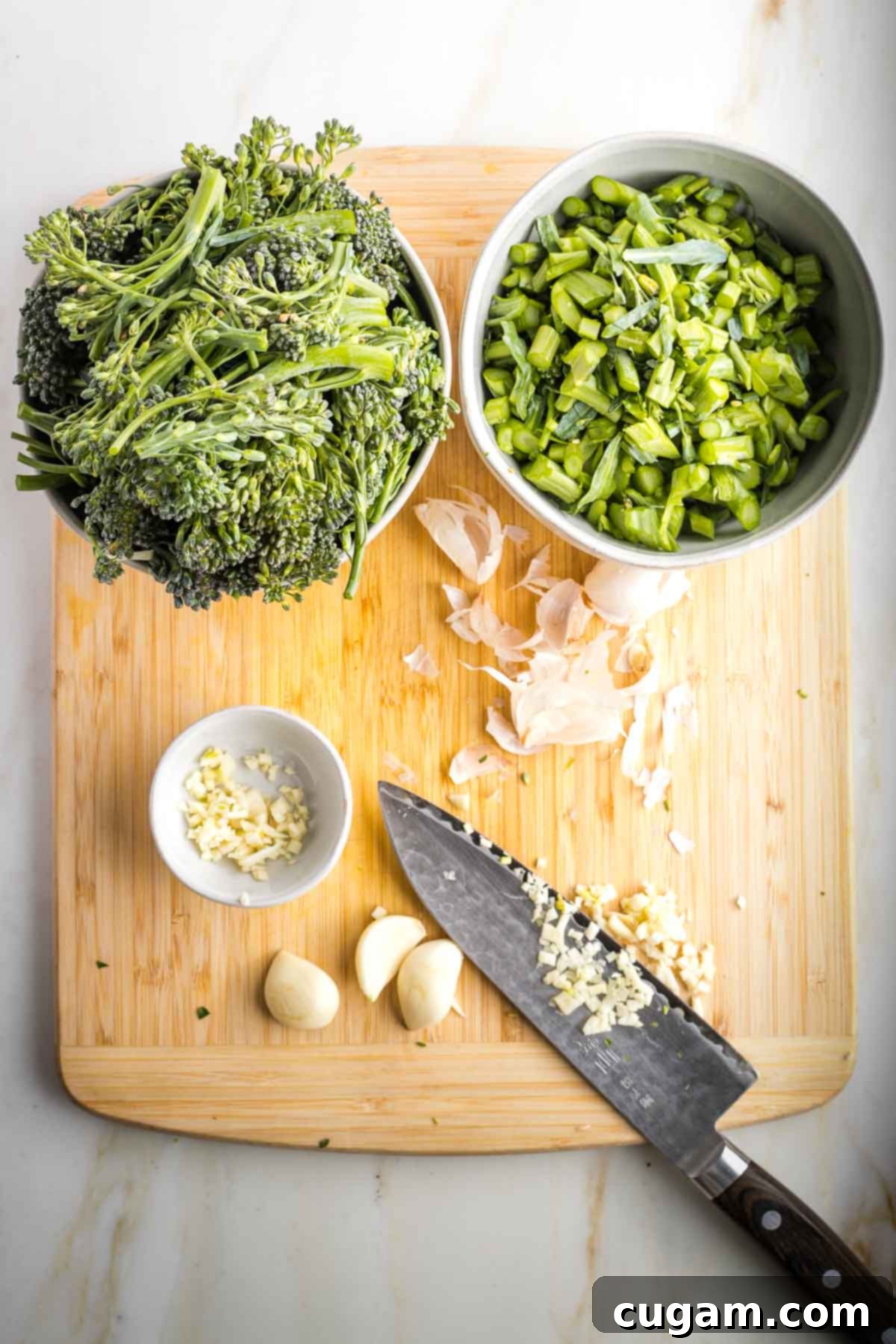
Peel and mince your garlic cloves. For a very fine consistency, you can also use a microplane grater. Set the minced garlic aside, allowing its potent flavors to develop before it hits the pan.
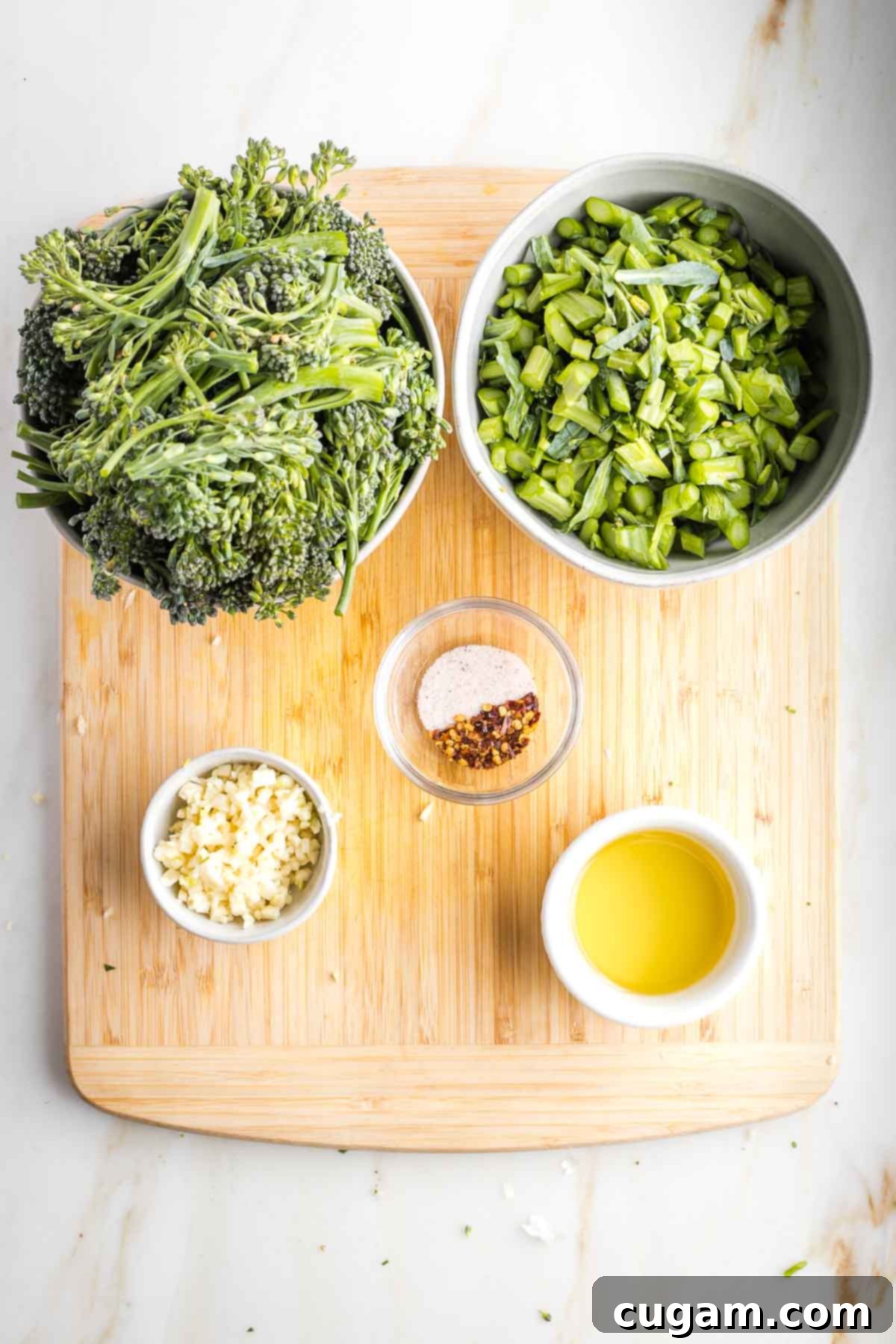
Measure out your olive oil, sea salt, and crushed red pepper flakes into small bowls or ramekins. This ensures everything is within arm’s reach when you start cooking, preventing frantic searching and potential burning of ingredients in a hot pan.
Mastering the Art of Sautéing Broccolini
Sautéing broccolini is a quick and effective cooking method that results in tender-crisp vegetables with maximum flavor. The key is using the right pan and managing your heat effectively. A large skillet is crucial to avoid overcrowding the pan, which can lead to steaming rather than sautéing.
I personally prefer a cast iron skillet for its excellent heat retention and even cooking, but any large, heavy-bottomed skillet you have will work well. If you choose not to use oil, you can certainly sauté with a little water or veggie broth instead, though I don’t recommend using a non-stick skillet for this method as it won’t achieve the same slight char and caramelization that adds so much flavor.
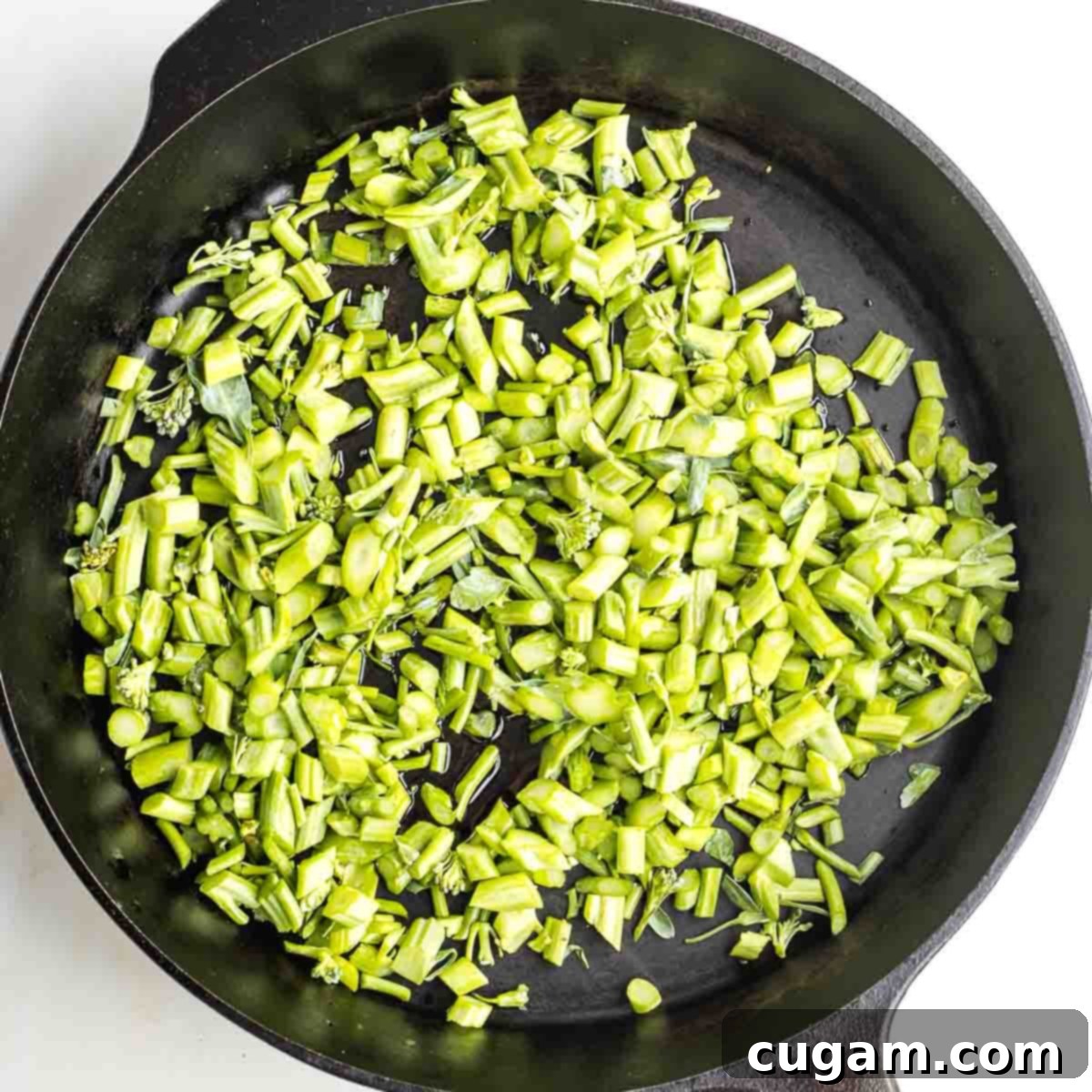
Preheat your chosen skillet over medium-high heat. You want the pan to be hot enough to sizzle when the broccolini is added. Once hot, swirl in 1 tablespoon of the olive oil, then add the chopped, thicker broccolini stems (from the first bowl).
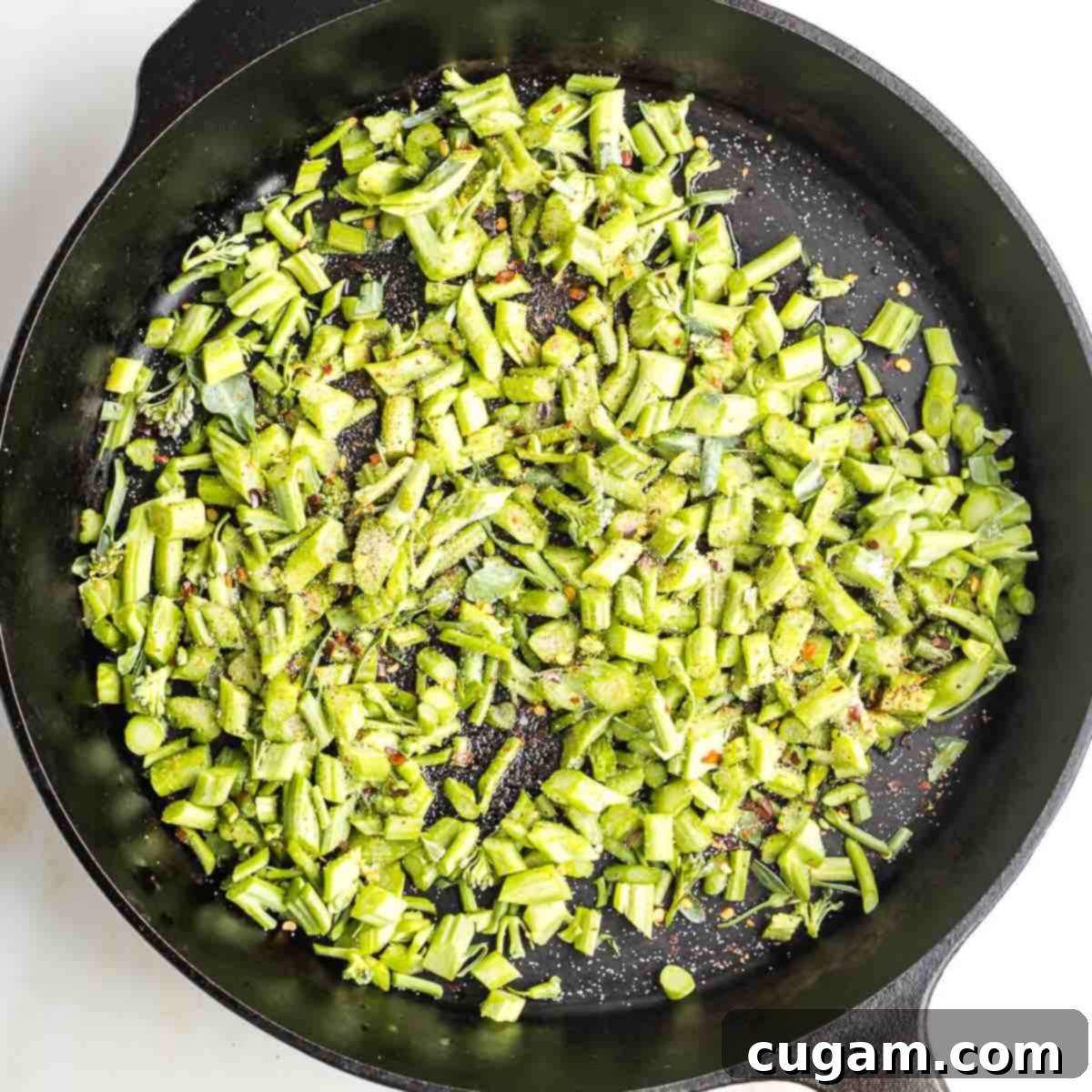
Sprinkle the sea salt and red pepper flakes over the stems. Sauté for 2-3 minutes, stirring frequently. This initial cooking step allows the heartier stem pieces to start softening and developing some char before the more delicate florets are added.
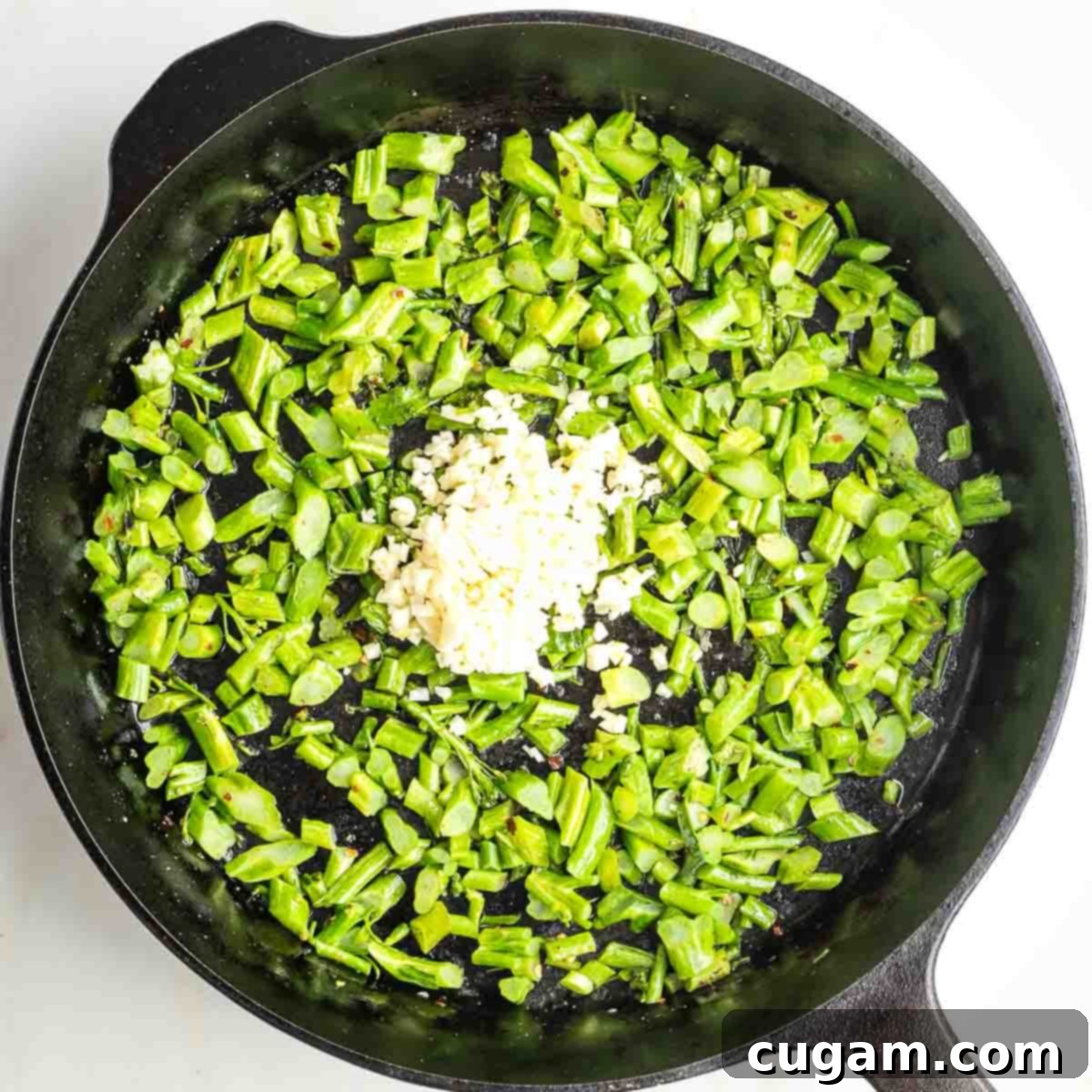
Push the broccolini stems to the side, then add the minced garlic directly into the center of the skillet. Immediately reduce the heat to medium. This timing is crucial to prevent the garlic from burning, which can turn it bitter.
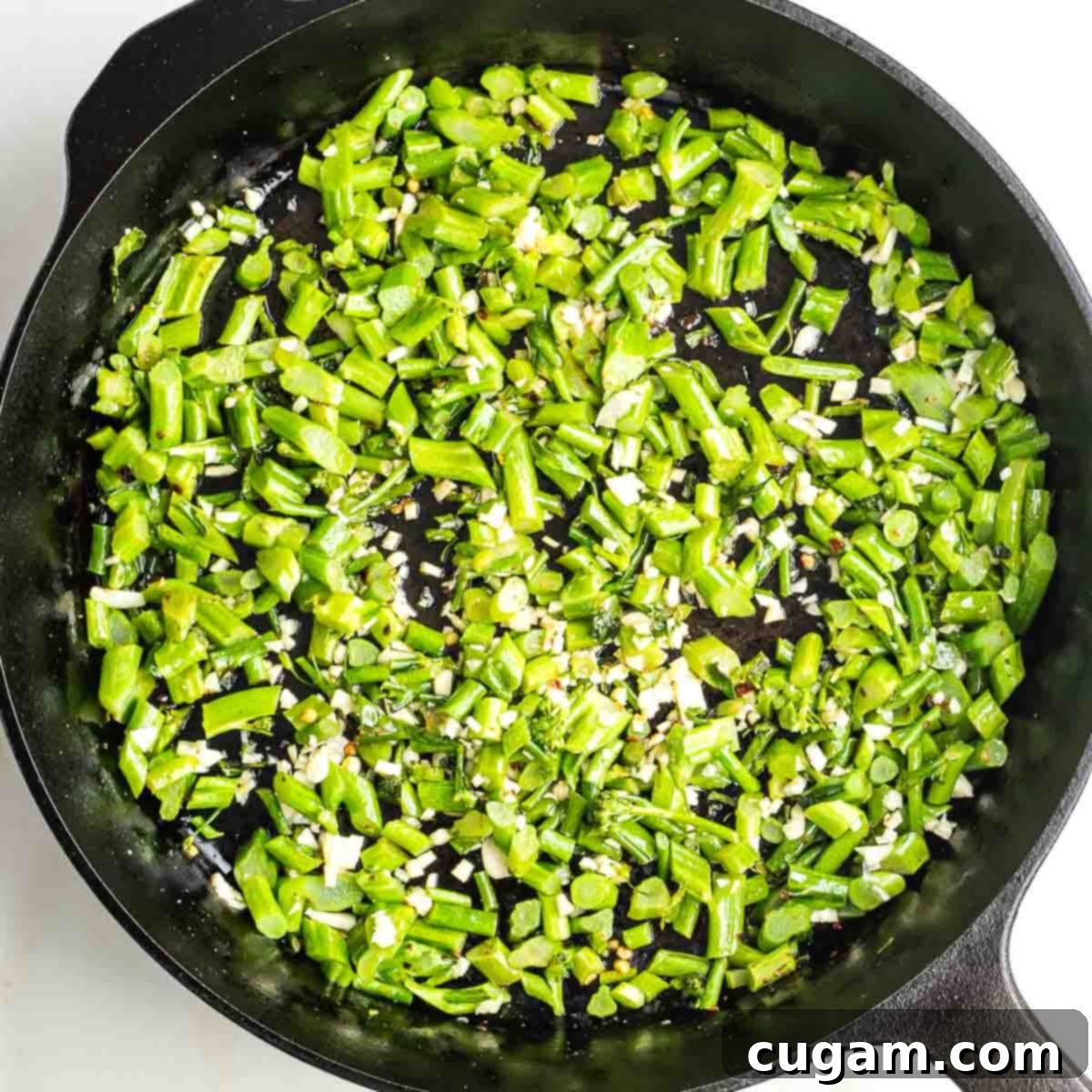
Cook the garlic, stirring constantly for about 30 seconds. You want it to become wonderfully fragrant and lightly golden, but be extremely careful not to let it burn. Burnt garlic will impart an unpleasant taste to the entire dish.
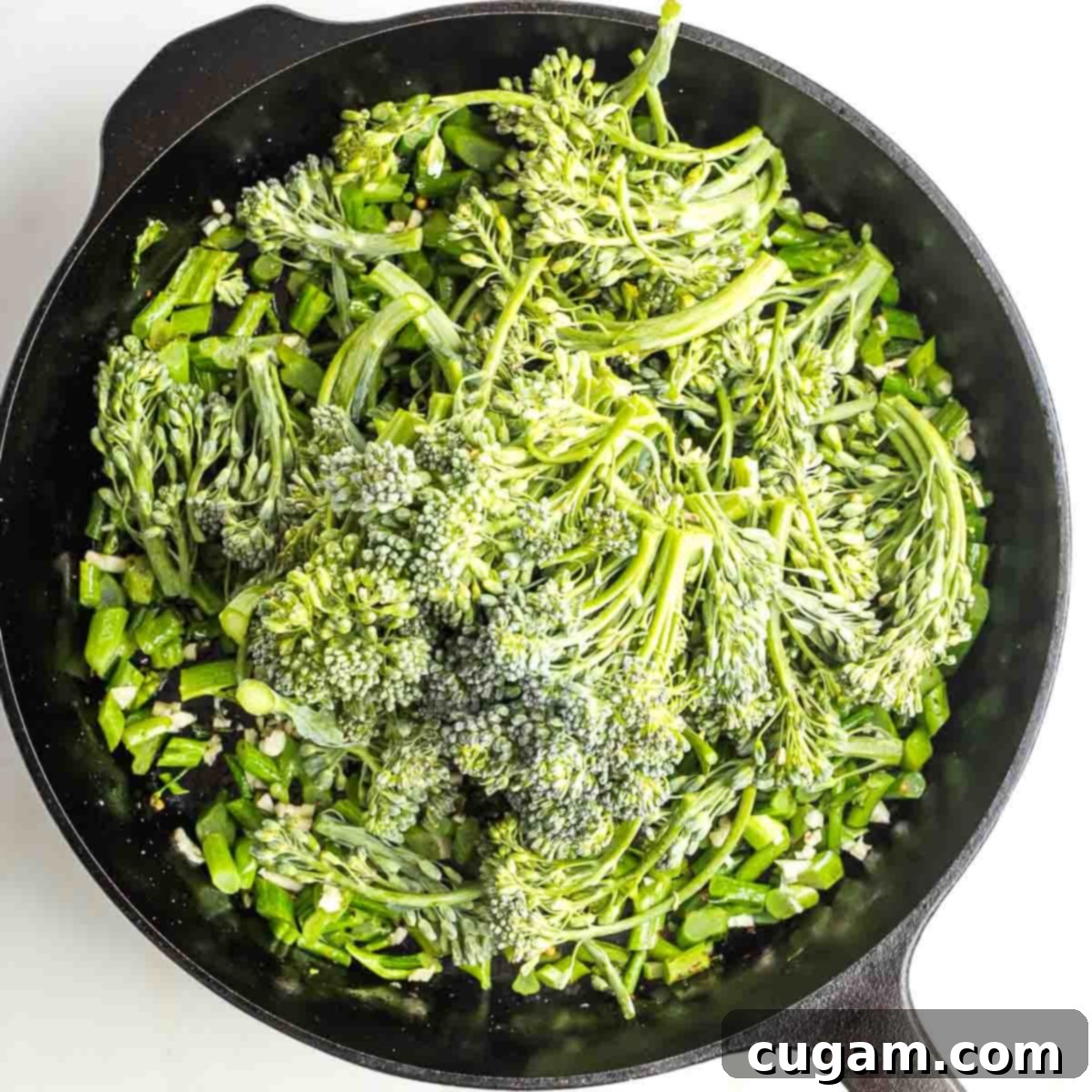
Now, add the broccolini florets and thinner stems (from the second bowl) to the pan. Drizzle the remaining tablespoon of olive oil over these new additions, ensuring everything gets a light coating.
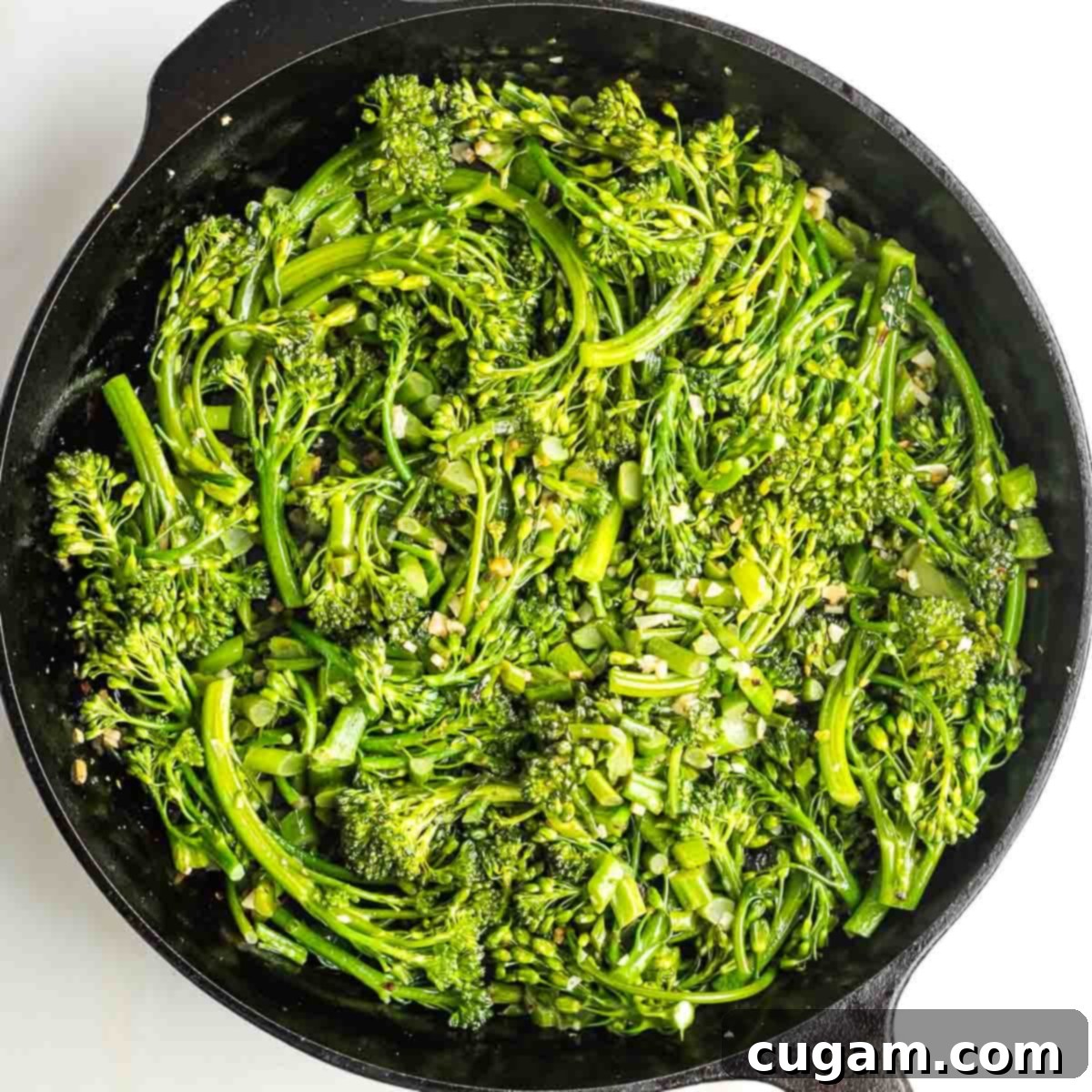
Stir everything together to combine the garlic and spices with all the broccolini. Continue to cook for another 2 minutes. The dish is perfectly done when the broccolini turns a vibrant, bright green and the stems are tender-crisp (al dente) – still with a slight bite, but not mushy.
Once cooked, immediately transfer the sautéed broccolini to a serving dish. If left in the hot skillet, the residual heat will continue to cook the vegetable, potentially leading to an overcooked, less vibrant result. Serve warm or at room temperature as a fantastic side to your favorite mains.
Adapt this Sautéing Method for Other Vegetables
Absolutely! This sautéing technique is incredibly versatile and can be applied to a variety of other green vegetables. The core principle of cooking heartier parts first ensures even tenderness and vibrant color throughout the dish. Here’s how you can adapt it:
- The key principle is to start cooking the more fibrous, thicker stems or heartier portions of the vegetable first. This allows them to become tender at the same rate as the more delicate leaves or florets, ensuring the entire vegetable cooks evenly without any part being undercooked or overcooked.
- Always keep an eye on your green veggies; they typically turn a vivid, bright green when they are perfectly cooked al dente. If they start to turn a dull, darker green or brownish, they are likely overdone and may lose their crisp texture and fresh flavor.
- Many root vegetable tops, such as radish tops, turnip greens, and beet greens, are not only edible but also incredibly nutritious and delicious when sautéed. These are best cooked separately from the actual root vegetable itself. Start by carefully separating the leaves from their tougher stems. Thinly chop the stems and begin to sauté them until they just start to get tender before adding the more delicate chopped leaves to the pan for a quick wilt.
- Any leafy green vegetable that features a prominent inner stem or rib can greatly benefit from this staggered cooking process. Think about robust greens like elephant (lacinato) kale, Swiss chard, curly kale, or collard greens. For these, first remove the tough central rib from the leaves. Thinly slice the ribs and sauté them in the pan until they begin to soften before tossing in the rest of the chopped greens for a quick cook until just wilted and bright green.
- A crucial tip for this or any sautéing method: garlic burns very easily! To prevent it from becoming bitter and acrid, always add the minced garlic towards the end of the cooking process. Once added, stir it constantly for just 30-60 seconds until it’s fragrant but not browned, then immediately add your next ingredient or remove it from the heat.
Debra’s Pro Tips for Perfect Broccolini
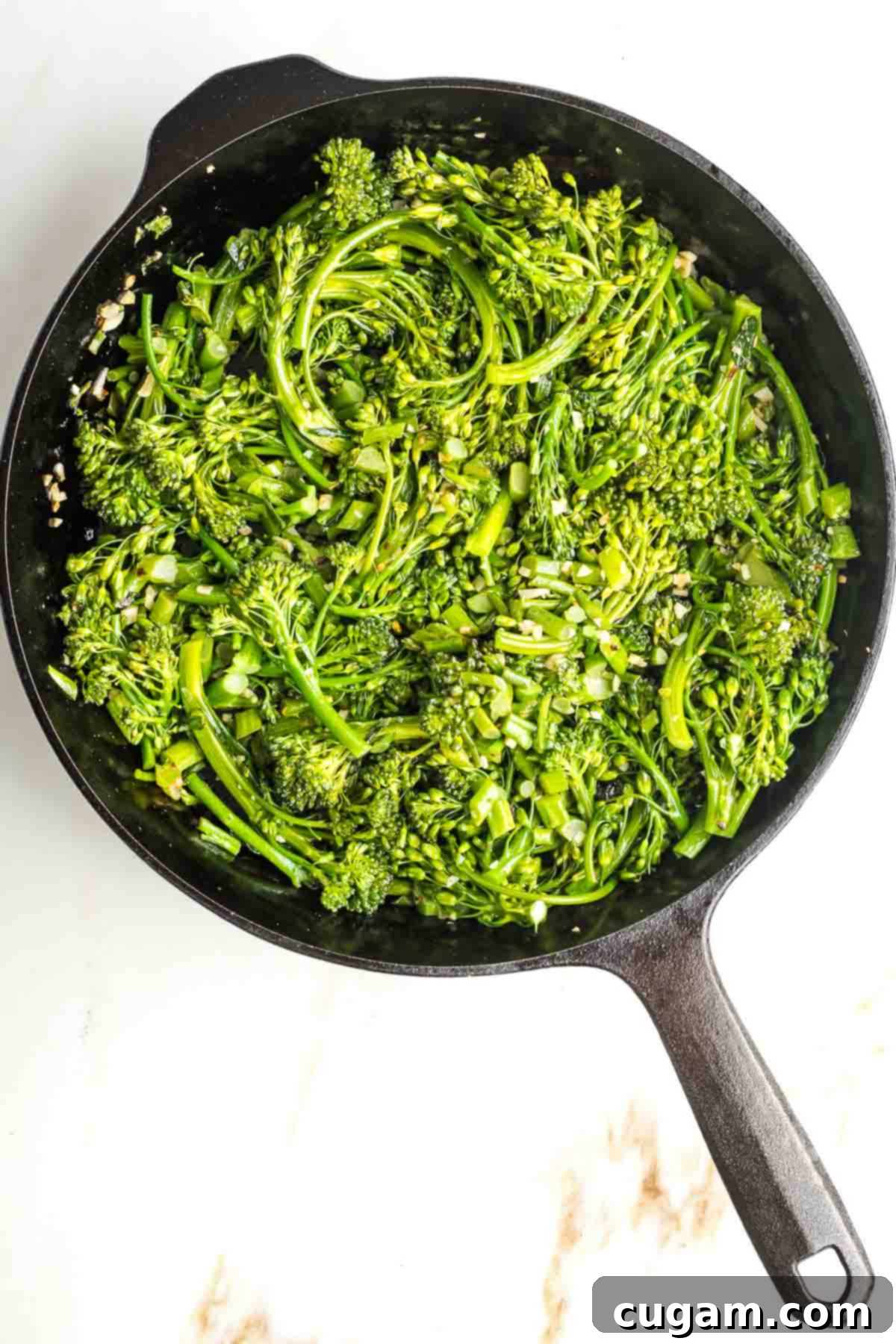
- Sautéed broccolini cooks remarkably fast due to its slender stems. The stovetop method is truly the best way to achieve its tender-crisp texture. If the pan appears a bit dry during cooking, a small splash of water (about a tablespoon) can be added to create a little steam, but there’s no need to boil the broccolini in cups of water, which can leach out nutrients and flavor.
- For those who enjoy a bright, citrusy counterpoint, serve your finished broccolini with fresh lemon wedges. Guests can then squeeze fresh lemon juice over their individual portions. I find the dish to be one of the tastiest side dishes as is, so I usually wouldn’t add lemon juice directly to the entire dish, allowing personal preference.
- This recipe makes an incredibly easy side dish perfect for any family dinner. For a charming and rustic presentation, you can place the hot cast iron skillet directly onto a trivet at the center of your table and serve it straight from the pan. It adds a wonderful, communal feel to the meal.
- Any leftover sautéed broccolini can be stored in an airtight container in the fridge for up to 5 days. It’s delicious enjoyed cold as part of a salad, at room temperature, or gently reheated in a hot skillet for just 2 minutes until warmed through and slightly revitalized.
The Wonderful Health Benefits of Broccolini
Beyond its fantastic taste and ease of preparation, broccolini is a powerhouse of nutrition that offers numerous health advantages. As a member of the cruciferous vegetable family, it shares many benefits with its cousin, broccoli, but often comes with a slightly sweeter profile that makes it even more enjoyable.
Broccolini is exceptionally rich in essential vitamins and minerals. It’s an excellent source of Vitamin C, which is crucial for immune function and skin health, and Vitamin K, vital for blood clotting and bone health. It also provides a significant amount of Vitamin A, beneficial for vision and immune support. Furthermore, broccolini contains dietary fiber, which aids in digestion, promotes gut health, and helps maintain stable blood sugar levels.
One of the most notable aspects of broccolini is its abundance of antioxidants and phytonutrients, including sulforaphane, glucosinolates, and carotenoids. These compounds are known for their powerful anti-inflammatory and cancer-fighting properties. Regular consumption of cruciferous vegetables like broccolini has been linked to a reduced risk of various chronic diseases. Incorporating this quick and delicious sautéed broccolini into your diet is a simple and tasty way to boost your overall well-being.
More Healthy Side Dish Recipes You’ll Love
Looking for more delicious and healthy accompaniments to your meals? Here are some other fantastic side dish recipes that are easy to prepare and packed with flavor:
- Mediterranean Cauliflower Rice
- Easy Recipe for Green Beans with Almonds
- Crispy Oven Roasted Brussels Sprouts (Honey Sriracha Sauce)
- Oven Roasted Crispy Broccoli
Did you know commenting and rating recipes is one of the best ways to support your favorite food bloggers? If you made this recipe, please consider leaving a five-star rating below and a comment sharing your experience. Also, we’d love to see your culinary creations! Please share your photos on Instagramby tagging me @dkhealthcoach and using the hashtag #debraklein. Your feedback and shares truly help our community grow!
📖 Recipe
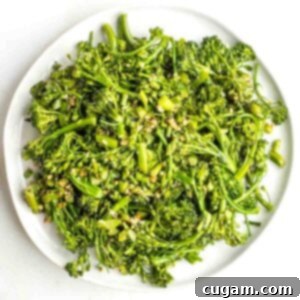
Sautéed Broccolini and Garlic
Rate this Recipe
Pin Recipe
Equipment
-
Cast iron skillet
-
Cutting Board
-
Chef’s knife
Ingredients
- 1 lb broccolini
- 2 tablespoon olive oil divided
- ½ teaspoon sea salt
- ½ teaspoon crushed red pepper
- 5 cloves garlic minced
Instructions
-
Wash the broccolini thoroughly and pat it completely dry. Chop the bottom third of the broccolini stems into uniform ½-inch thick discs; set these aside in a separate bowl. Leave the tops (florets and thinner stems) mostly intact, separating only very large clusters, and place them in another bowl. Finally, mince all the garlic cloves and set aside.
-
Heat a large skillet over medium-high heat until hot. Swirl in 1 tablespoon of the olive oil, then add the chopped, thicker broccolini stems. Reduce the heat to medium. Sprinkle the stems with sea salt and crushed red pepper and cook, stirring frequently, for about 3 minutes until they begin to soften and develop a slight char.
-
Add the minced garlic cloves to the skillet (you can push the broccolini to one side to give the garlic direct contact with the pan). Cook for only 30 seconds, stirring constantly, until the garlic is wonderfully fragrant but not browned or burnt. Immediately stir in the remaining tablespoon of olive oil and add the broccolini florets and thinner stems to the pan.
-
Stir everything together to ensure the garlic and spices are evenly distributed. Continue to cook for another 2 minutes, stirring occasionally, until the broccolini turns a vibrant bright green and the stems are tender-crisp (al dente) – still with a pleasant bite, but not mushy.
-
Transfer the sautéed broccolini to a serving dish immediately to prevent further cooking from residual pan heat. Serve warm or at room temperature as a delicious and healthy side dish.
Notes
Nutrition
Note
The nutrition calculations were done using online tools. To obtain the most accurate representation of the nutritional information in any given recipe, you should calculate the nutritional information with the actual ingredients you used. You are ultimately responsible for ensuring that any nutritional information is accurate, complete and useful.
